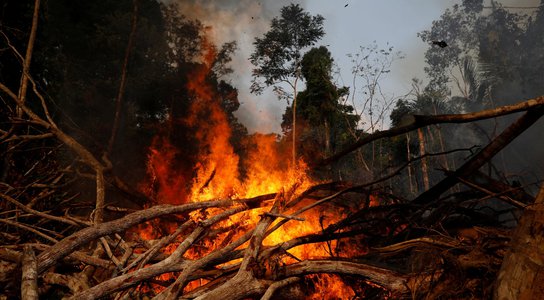The world is in the midst of fighting the devastating coronavirus pandemic, with leaders focusing on the immediate task of saving lives. In the coming months, efforts to rebuild the global economy on a sustainable footing will be critical to our emergence from the crisis. As we approach that task we should pay particular heed to the findings today of a key UK government taskforce on deforestation.
The Global Resources Initiative (GRI) taskforce was charged with developing recommendations on how to tackle the UK’s deforestation footprint – the destruction of global forests associated with UK imports and UK based business. Comprised of representatives of agri-food companies, financial institutions and civil society, it has put forward a series of recommendations to tackle the destruction of the world’s climate-critical forests. Crucially, the taskforce has backed calls for mandatory due diligence, which would require business, including finance, to adopt measures to address their deforestation risk.
Today, UK imports of commodities associated with deforestation – like beef, leather, soy, palm oil and timber – take up an area of land more than half the size of the UK, according to WWF and RSPB. And the UK doesn’t just consume these products: it finances them too. Global Witness has found the UK to be the single largest source of international credit to six of the most harmful agribusiness companies linked to forest destruction, providing £5 billion between 2013-2019. For years, people across the UK and around the world have called for action to clean up these supply chains.
Critically, the GRI report highlights that mandatory due diligence should apply to the financial sector. Given the UK’s outsized role in financing companies linked to forest destruction this is common sense recognition that banks that finance forest-risk sectors should be playing by the same rules as their clients. It is significant that a taskforce heavily stacked with industry is making this recommendation; a sign that companies increasingly recognise the mounting pressure on business to act responsibly to avoid harming people or the environment.
Indeed, deforestation and forest-related human rights abuses in the Amazon contribute to the global climate change that drives floods in Gloucester or fires in Australia. Academics are also raising the alarm that tropical forests are fast approaching a ‘tipping point’, shifting from capturing carbon to become a net source of emissions as dying trees release carbon.
How the UK government responds to the GRI recommendation on due diligence will be critical to the UK’s aspirations to take leadership in the new economies that are emerging in an era of unprecedented social and ecological crisis.
Businesses, including financial institutions, that take greater heed of social or environmental concerns are likely to be more resilient in these turbulent times. Supply chains that perpetually require the destruction of forests are unstable and out of touch with local realities, rendering them less stable.
Today, the City of London aspires to be a world leader on green finance. However, as we stressed to GRI, this will have little impact without action to tackle the vast ocean of finance which is unsustainable. London’s efforts to be the global capital of green finance will lack credibility if the same banks offering forest-friendly deals are simultaneously making headlines for backing companies linked to forest destruction in the Amazon or South-East Asia. The best way to save our remaining climate-critical forests is simply to not cut them down.
Alongside due diligence, the GRI report includes some other welcome recommendations, including: a Strategic Sustainable Commodity Action Plan; requiring government food procurement to quickly transition to be deforestation free; and the need for trade agreements to include clear social and environmental provisions.
However, Global Witness has some concerns about GRI recommendations promoting carbon markets. We have reservations about ‘blended finance’ supporting the private sector to do what it should already be doing to tackle deforestation. The report also overlooks some of the underlying causes and contributors to deforestation (including corruption and violence against forest defenders), provides limited recognition of the role and expertise of forest communities in combatting deforestation and is light on detail about transparency. Fully transparent supply chains and financing, which publicly communicates exactly what companies or banks are doing, is one of the most far-reaching ways to build accountability and should be a key pillar of efforts on deforestation.
While governments are now grappling with a global pandemic, there is an opportunity for them to shape the global system that emerges after the current crisis. This should include resilient and sustainable supply chains and economies that take responsibility for their global environmental footprint and work with communities, not against them. For the UK government, the GRI taskforce provides an important first step for global leadership on deforestation and is a role we hope the UK government will continue to lead on.


